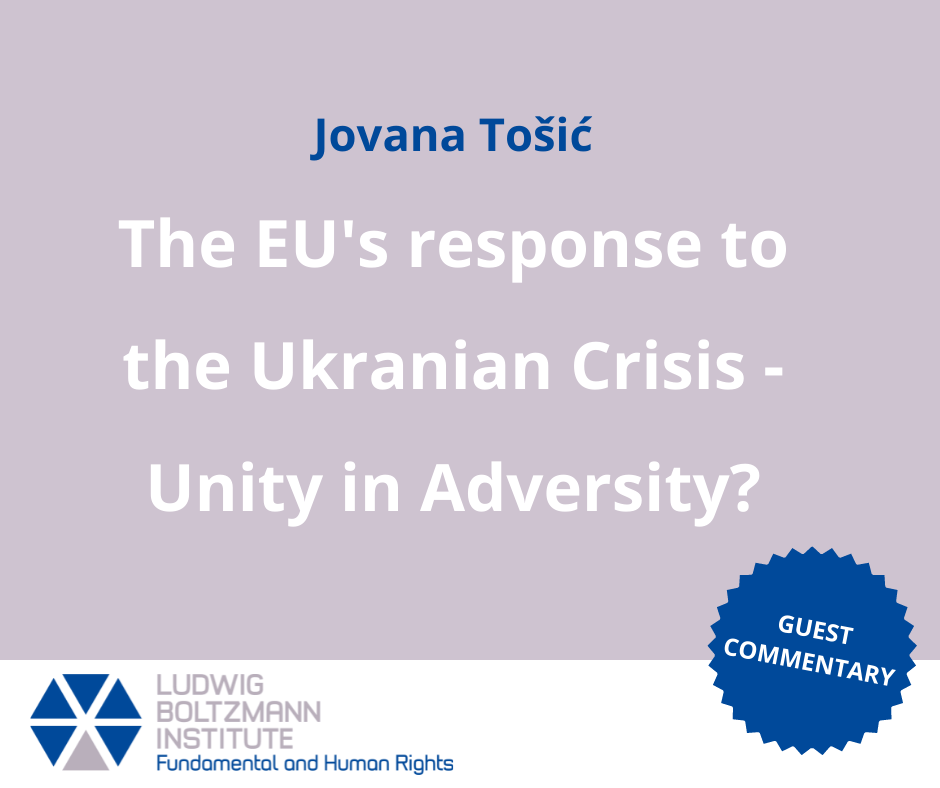Guest Commentary by Jovana Tosic: The EU’s Response to the Ukranian Crisis – Unity in Adversity?
THE EU’S RESPONSE TO THE UKRANIAN CRISIS – UNITY IN ADVERSITY?
– A commentary by Jovana Tošić (Serbia), guest researcher at the LBI-GMR.
Tensions between Russia and Ukraine have been at the forefront of today’s geopolitical concerns. Almost eight years after the annexation of Crimea, Russia went on to deploy about 100,000 troops near the Ukrainian border which raised the global fears of a new war in Europe.
Following non-compliance with the Minsk Agreement aimed at establishing the peace in Eastern Ukraine, the EU has decided to prolong restrictive measures currently targeting financial, military and energy sectors of the Russian Federation by additional 6 months. Under the restrictions, the EU’s capital market is off limits for the Russian banks and companies. Likewise, the EU operators are prohibited from providing services to Russian financial institutions. Even though the EU has reportedly stood up against the continued Russian military buildup in and around Ukraine, the EU leaders seem to be divided over what type of response would effectively deter Russia from threatening Ukraine. They have been debating over possible trade bans, energy penalties and cutting off Russia from hi-tech and financial markets. From the perspective of the procedural requirements, the EU’s restrictive sanctions require the total unanimity of 27 Member States which is particularly challenging in practice. Despite the fact that the EU’s High Representative of Foreign Affairs called for unity with the U.S. and NATO, the EU seems to be united only over the sanctions in case of an actual attack at the Ukrainian soil, but beyond that there is still no agreement on other trigger points. While France is advocating for the unified diplomatic approach, other Member States, mostly of the eastern bloc who have a troubled history with Russia, prefer more aggressive, transatlantic response in order to demonstrate strength and compensate for the wrongs of the past. At the same time, the U.S. and NATO are increasing their deployment efforts by putting thousands of soldiers on high alert across the Ukraine’s neighborhood and they have been supported by some European states such as Spain, Belgium and Netherlands. (Un)surprisingly, Germany seems to be watching a diplomatic surge from the sideline thus refusing to transfer anything but medical assistance to the Ukrainian territory. The newly established German Government has been withholding from a strong political stance as well as military deployment mostly due to its close economic ties with Russia. On the other side of the coin, Russia denies any invasion plans against Ukraine and accuses the West for the deteriorating political situation. What is more, Russia seems to be aware of the lack of unity within Europe which could possibly give the Kremlin wind at their back and motivate them to move their troops further towards Ukraine.
The EU, along with its partners, needs to articulate its joint diplomatic action and identify specific triggers for different means of restrictive sanctions. The EU’s Anti-Coercion Instrument recently proposed by the Commission opens the room wide open for economic sanctions against Russia by enabling the Union to counteract the offensive measures coming from third countries. The question, however, might arise as to whether these measures would violate the EU’s obligations under the international law considering the prohibition of coercion under the general principle of non-intervention. Along these lines, it is important to recall lawful exceptions to the general rule under the theory and practice of international law which allow for both military and non-military action when the international peace is at stake. Besides, the EU has shown itself willing to preserve its own order sometimes even at the expense of the international one, as the infamous judgment of Kadi has revealed.
Finally, it is important to draw attention to potential human rights abuses resulting from Russian military threats and possible invasion. Should the crisis escalate further into actual military action, the consequences would have been devastating especially considering the recent history of troublesome Russian military interventions in Syria and beyond. The humanitarian disaster of this kind would probably result in yet another wave of various migration flows towards neighboring European countries which could perpetuate the EU’s current internal disagreements over the foreign policy but also stir up some already-existing tensions in the sphere of the EU’s asylum policy. Also, the geopolitical checks and balances could be seriously affected by possible weaponization of countries’ energy policies which bears inconceivable consequences on human rights of millions of people.
Therefore, the EU needs to revive its internal strength and unity beyond mere diplomatic rhetoric or it will continue to be pushed to the sideline. Although the aforementioned set of anti-coercion measures could be perceived as a useful strategy towards Russia, the latter is meant to be set in motion only if the opponent crosses the “red line”. With recent internal disagreements as to how to approach the Ukrainian question (either with severe or limited measures) it is hard for the EU to be seen as a leading international actor at the moment. If Ukraine falls, we could be witnessing one of the most dangerous moments of the post-Cold war period in Europe with some serious consequences suffered on the part of the Union and its common foreign and security policy.
